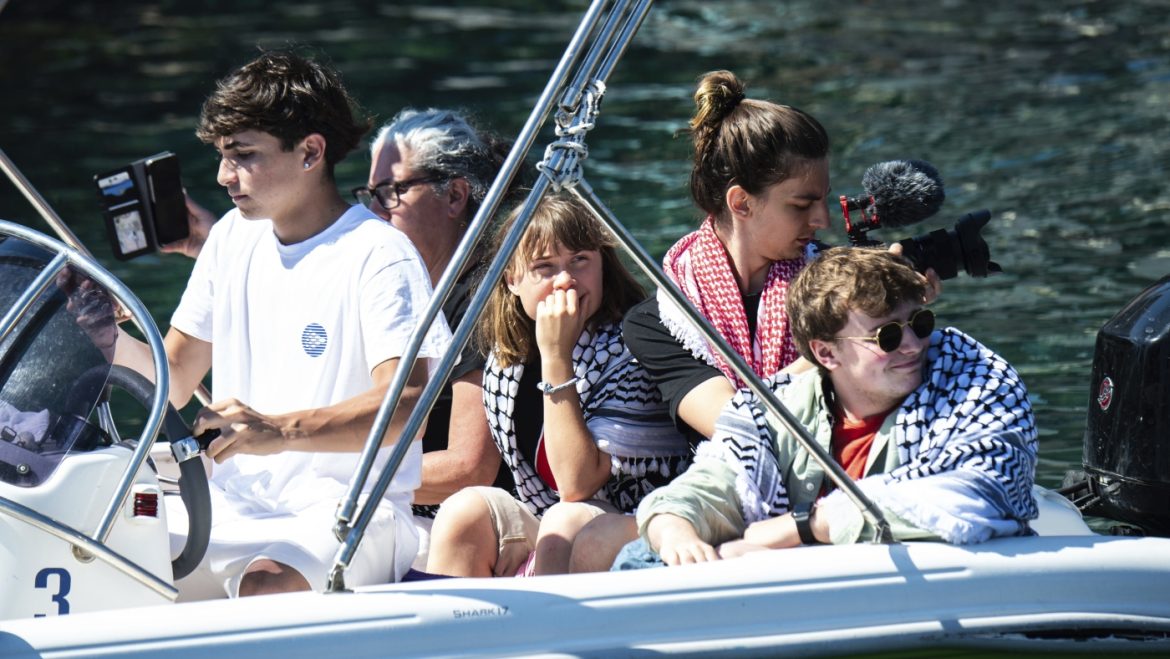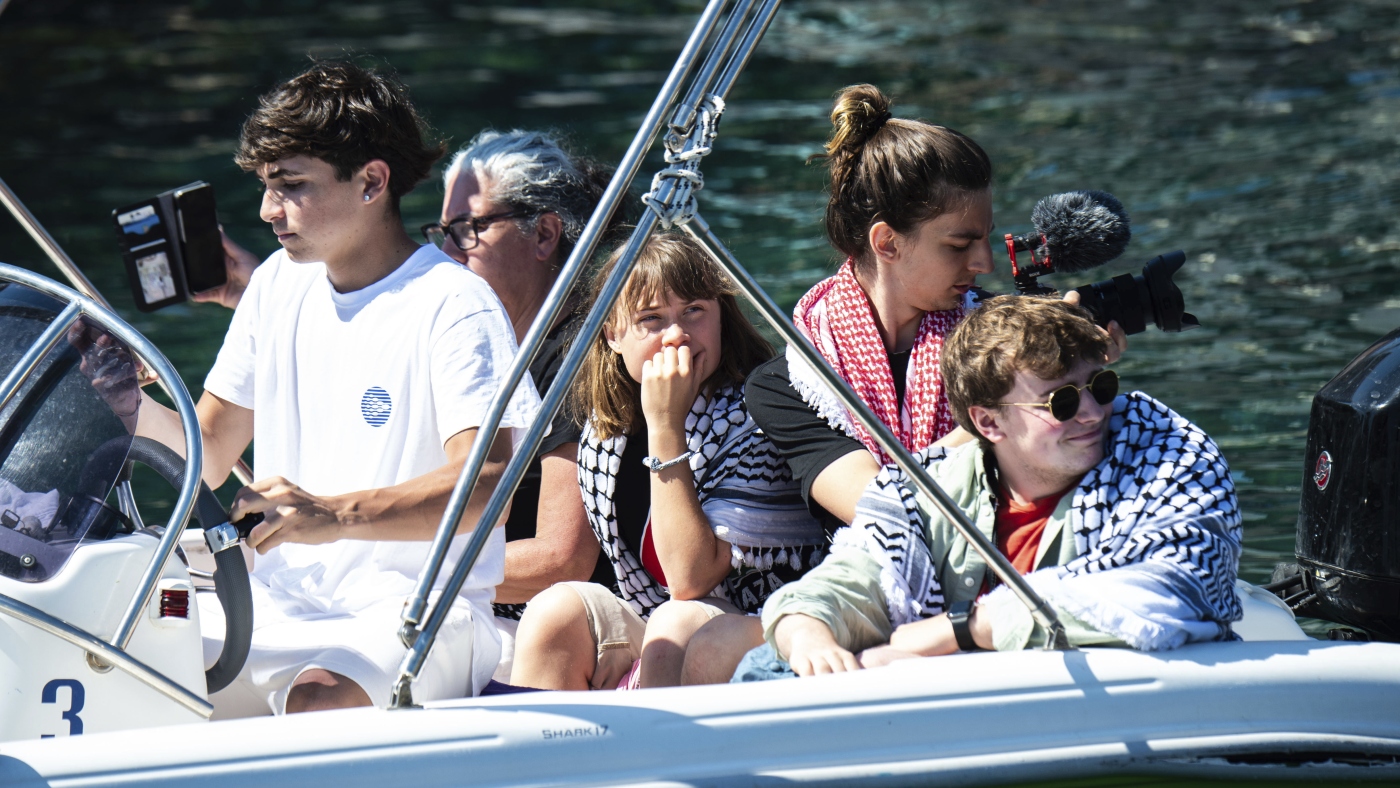The interception of the Gaza-bound aid boat “Madleen,” carrying Swedish climate activist Greta Thunberg and other prominent activists, by Israeli forces marks a significant and multifaceted event amid the ongoing conflict and humanitarian crisis in the region. This analysis explores the circumstances, geopolitical implications, legal considerations, and broader symbolism of this confrontation in the context of Israeli-Palestinian tensions and international activism.
Background: The Madleen Aid Flotilla and Its Mission
The “Madleen,” a British-flagged vessel operated by the Freedom Flotilla Coalition, set sail from Sicily with a crew of twelve that included Greta Thunberg, actor Liam Cunningham, and other high-profile activists. Their declared mission was twofold: to break the longstanding Israeli naval blockade of Gaza and to deliver humanitarian aid to the embattled Palestinian territory. This blockade, which Israel enforces citing security concerns related to Hamas, has been tightened significantly during the ongoing war. The flotilla also sought to protest Israel’s military campaign in Gaza, particularly amidst escalating casualties and worsening humanitarian conditions.
Israeli Interception and Detention
Israeli naval forces intercepted the yacht approximately 100 nautical miles from Gaza in international waters and took command of the vessel. The Israeli Defense Ministry reported detaining the activists onboard, including Thunberg, and diverting the ship to an Israeli port. The Israeli government justified the action by emphasizing the enforcement of its naval blockade, which it argues is vital for national security and to prevent arms smuggling to Hamas. Israel Defense Minister Israel Katz vowed to prevent the flotilla’s passage “by any means necessary,” underscoring the high stakes Israel places on maintaining the blockade during an active conflict.
Legal and Security Dimensions
The legality of Israel’s naval blockade and interception of vessels in international waters remains a contentious issue. Israel considers the blockade a legitimate security measure to prevent the inflow of weapons to Hamas, a group it designates as a terrorist organization responsible for attacks on Israeli civilians. Nonetheless, critics argue that the blockade constitutes collective punishment against Gaza’s 2 million residents, exacerbating humanitarian hardship.
Under international law, naval blockades are allowed during armed conflicts if they meet strict criteria, including adequate notification, impartial enforcement, and the provision of humanitarian aid. Israel contends it allows humanitarian aid into Gaza through land crossings, making the maritime blockade necessary. However, groups like the Freedom Flotilla Coalition dispute the blockade’s legality and claim the interception violates international norms, as well as the rights of activists carrying humanitarian aid.
Political and Symbolic Significance
Greta Thunberg’s presence on the flotilla elevates the incident from a regional military enforcement action to an event with global resonance. Known worldwide for her climate activism and outspoken advocacy for social justice, Thunberg’s involvement signals an attempt to internationalize the issue and galvanize international public opinion against the blockade and the broader conflict.
The flotilla reflects a long history of activist attempts to challenge the Gaza blockade, recalling similar incidents such as the 2010 Mavi Marmara confrontation, which resulted in casualties and international outrage. By including celebrity activists and environmental campaigners, the Freedom Flotilla Coalition seeks to broaden the base of solidarity with Gaza and frame the crisis not only as a political or military conflict but also a human rights and humanitarian cause.
Broader Humanitarian Context and Conflict Dynamics
The restriction of Gaza’s sea access is just one aspect of the broader restrictions on movement and goods that have contributed to dire conditions inside Gaza—widespread poverty, food insecurity, electricity shortages, and collapsed infrastructure. The ongoing war between Israel and Hamas has amplified the urgency of humanitarian needs and polarized global discourse.
Israel views the blockade and military measures as necessary responses to Hamas’s attacks and infrastructure. Meanwhile, activists and advocacy groups portray these measures as disproportionate and punitive against Gaza’s civilian population, calling for international pressure to lift the blockade and end hostilities.
Conclusion: A Microcosm of Conflict and Advocacy
The Israeli seizure of the “Madleen” aid boat carrying Greta Thunberg and other activists encapsulates many of the tensions surrounding the Gaza blockade and the Israeli-Palestinian conflict. It underscores the challenges of navigating security concerns, international law, humanitarian advocacy, and political symbolism in a deeply contentious and volatile context.
While Israel asserts its right to enforce the blockade to safeguard its citizens against Hamas, activists on the flotilla frame their mission as a vital humanitarian and moral stand against what they consider an unjust and devastating siege. The involvement of internationally recognized figures like Thunberg ensures that the incident will remain a focal point in global debates about the Gaza conflict, humanitarian access, and the power of activism amid armed conflict.
Ultimately, the “Madleen” interception highlights that humanitarian efforts in conflict zones are often caught at the intersection of politics, security, and international law, raising questions about how aid can be delivered without becoming entangled in the larger dynamics of warfare and sovereignty. This event is emblematic of the ongoing struggle for narratives and legitimacy that characterize the Israeli-Palestinian conflict and the international community’s role within it.


